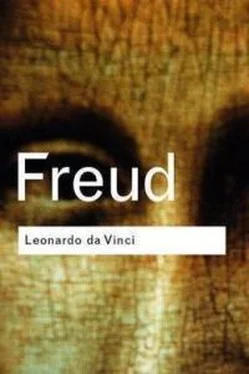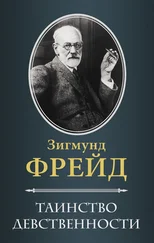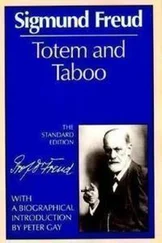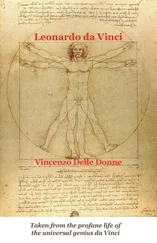When in the prime of his life Leonardo re–encountered that blissful and ecstatic smile as it had once encircled his mother's mouth in caressing, he had long been under the ban of an inhibition, forbidding him ever again to desire such tenderness from women's lips. But as he had become a painter he endeavored to reproduce this smile with his brush and furnish all his pictures with it, whether he executed them himself or whether they were done by his pupils under his direction, as in Leda, John, and Bacchus. The latter two are variations of the same type. Muther says: "From the locust eater of the Bible Leonardo made a Bacchus, an Apollo, who with a mysterious smile on his lips, and with his soft thighs crossed, looks on us with infatuated eyes." These pictures breathe a mysticism into the secret of which one dares not penetrate; at most one can make the effort to construct the connection to Leonardo's earlier productions. The figures are again androgynous but no longer in the sense of the vulture phantasy, they are pretty boys of feminine tenderness with feminine forms; they do not cast down their eyes but gaze mysteriously triumphant, as if they knew of a great happy issue concerning which one must remain quiet; the familiar fascinating smile leads us to infer that it is a love secret. It is possible that in these forms Leonardo disavowed and artistically conquered the unhappiness of his love life, in that he represented the wish fulfillment of the boy infatuated with his mother in such blissful union of the male and female nature.
JOHN THE BAPTIST
Among the entries in Leonardo's diaries there is one which absorbs the reader's attention through its important content and on account of a small formal error. In July, 1504, he wrote:
"Adi 9 Luglio, 1504, mercoledi, a ore 7 mori Ser Piero da Vinci notalio al palazzo del Potestà, mio padre, a ore 7. Era d'età d'anni 80, lasciò 10 figlioli maschi e 2 feminine." [64] "On the 9th of July, 1504, Wednesday at 7 o'clock died Ser Piero da Vinci, notary at the palace of the Podesta, my father, at 7 o'clock. He was 80 years old, left 10 sons and 2 daughters." (E. Müntz, l. c. p. 13.)
The notice as we see deals with the death of Leonardo's father. The slight error in its form consists in the fact that in the computation of the time "at 7 o'clock" is repeated two times, as if Leonardo had forgotten at the end of the sentence that he had already written it at the beginning. It is only a triviality to which any one but a psychoanalyst would pay no attention. Perhaps he would not even notice it, or if his attention would be called to it he would say "that can happen to anybody during absent–mindedness or in an affective state and has no further meaning."
The psychoanalyst thinks differently; to him nothing is too trifling as a manifestation of hidden psychic processes; he has long learned that such forgetting or repetition is full of meaning, and that one is indebted to the "absent–mindedness" when it makes possible the betrayal of otherwise concealed feelings.
We would say that, like the funeral account of Caterina and the expense account of the pupils, this notice, too, corresponds to a case in which Leonardo was unsuccessful in suppressing his affects, and the long hidden feeling forcibly obtained a distorted expression. Also the form is similar, it shows the same pedantic precision, the same pushing forward of numbers. [65] I shall overlook a greater error committed by Leonardo in his notice in that he gives his 77–year–old father 80 years.
We call such a repetition a perseveration. It is an excellent means to indicate the affective accentuation. One recalls for example Saint Peter's angry speech against his unworthy representative on earth, as given in Dante's Paradiso: [66] "He who usurps on earth my place, my place, my place, which is void in the presence of the Son of God, has made out of my cemetery a sewer." Canto XXXVII.
"Quegli ch'usurpa in terra il luoga mio
Il luoga mio, il luogo mio, che vaca
Nella presenza del Figliuol di Dio,
Fatto ha del cimiterio mio cloaca."
Without Leonardo's affective inhibition the entry into the diary could perhaps have read as follows: To–day at 7 o'clock died my father, Ser Piero da Vinci, my poor father! But the displacement of the perseveration to the most indifferent determination of the obituary to dying–hour robs the notice of all pathos and lets us recognize that there was something here to conceal and to suppress.
Ser Piero da Vinci, notary and descendant of notaries, was a man of great energy who attained respect and affluence. He was married four times, the two first wives died childless, and not till the third marriage has he gotten the first legitimate son, in 1476, when Leonardo was 24 years old, and had long ago changed his father's home for the studio of his master Verrocchio. With the fourth and last wife whom he married when he was already in the fifties he begot nine sons and two daughters. [67] It seems that in that passage of the diary Leonardo also erred in the number of his sisters and brothers, which stands in remarkable contrast to the apparent exactness of the same.
To be sure the father also assumed importance in Leonardo's psychosexual development, and what is more, it was not only in a negative sense, through his absence during the boy's first childhood years, but also directly through his presence in his later childhood. He who as a child desires his mother, cannot help wishing to put himself in his father's place, to identify himself with him in his phantasy and later make it his life's task to triumph over him. As Leonardo was not yet five years old when he was received into his paternal home, the young step–mother, Albiera, certainly must have taken the place of his mother in his feeling, and this brought him into that relation of rivalry to his father which may be designated as normal. As is known, the preference for homosexuality did not manifest itself till near the years of puberty. When Leonardo accepted this preference the identification with the father lost all significance for his sexual life, but continued in other spheres of non–erotic activity. We hear that he was fond of luxury and pretty raiments, and kept servants and horses, although according to Vasari's words "he hardly possessed anything and worked little." We shall not hold his artistic taste entirely responsible for all these special likings; we recognize in them also the compulsion to copy his father and to excel him. He played the part of the great gentleman to the poor peasant girl, hence the son retained the incentive that he also play the great gentleman, he had the strong feeling "to out–herod Herod," and to show his father exactly how the real high rank looks.
Whoever works as an artist certainly feels as a father to his works. The identification with his father had a fateful result in Leonardo's works of art. He created them and then troubled himself no longer about them, just as his father did not trouble himself about him. The later worriments of his father could change nothing in this compulsion, as the latter originated from the impressions of the first years of childhood, and the repression having remained unconscious was incorrigible through later experiences.
At the time of the Renaissance, and even much later, every artist was in need of a gentleman of rank to act as his benefactor. This patron was wont to give the artist commissions for work and entirely controlled his destiny. Leonardo found his patron in Lodovico Sforza, nicknamed Il Moro, a man of high aspirations, ostentations, diplomatically astute, but of an unstable and unreliable character. In his court in Milan, Leonardo spent the best period of his life, while in his service he evinced his most uninhibited productive activity as is evidenced in The Last Supper, and in the equestrian statue of Francesco Sforza. He left Milan before the catastrophe struck Lodovico Moro, who died a prisoner in a French prison. When the news of his benefactor's fate reached Leonardo he made the following entry in his diary: "The duke has lost state, wealth, and liberty, not one of his works will be finished by himself." [68] v. Seidlitz, l. c., II, p. 270.
It is remarkable and surely not without significance that he here raises the same reproach to his benefactor that posterity was to apply to him, as if he wanted to lay the responsibility to a person who substituted his father–series, for the fact that he himself left his works unfinished. As a matter of fact he was not wrong in what he said about the Duke.
Читать дальше









